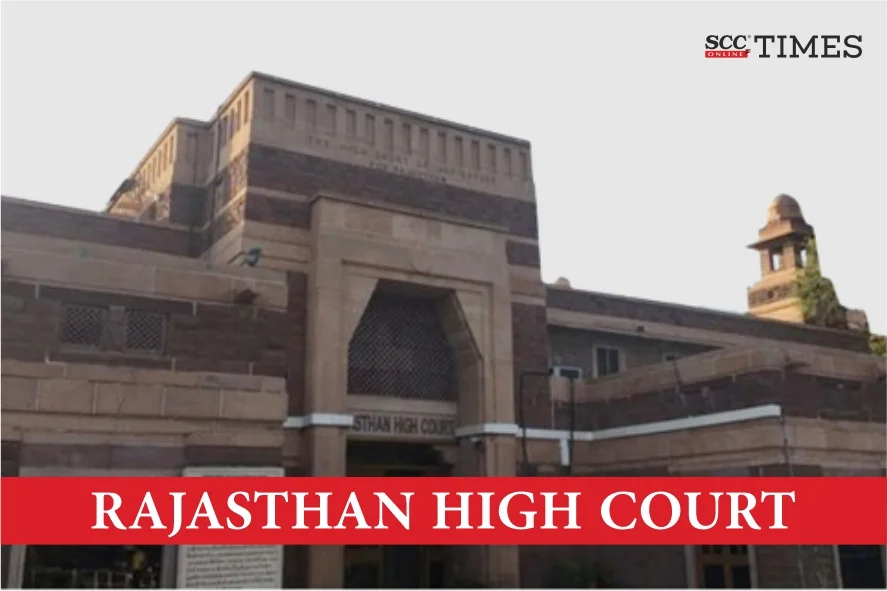Rajasthan High Court: In a criminal revision challenging the Additional Sessions Judge’s order taking cognizance against all accused, including petitioners, a single-judge bench comprising of Anoop Kumar Dhand, J., affirmed that after committal by the Magistrate, the Court of Sessions holds original jurisdiction and can take cognizance against accused persons not charged by the police. However, regarding the petitioners against whom cognizance was taken in parts by Magistrate and Additional Sessions Judge, the Court held such action is impermissible, as the same amounted to taking cognizance twice for different offenses by different courts at different stages.
Brief Facts
In the instant matter, the petitioners invoked the revisional jurisdiction under Section 397 read with Section 401 of the Criminal Procedure Code, 1973 (CrPC), challenging the legality of the order dated 11-02-2019 passed by the Additional Sessions Judge, Jaipur, stemmed from criminal case, where the complainant filed an application under Section 193 CrPC seeking cognizance against all accused, including petitioners. The impugned order allowed the application leading to the petitioners being charged under various sections of the Indian Penal Code (IPC) and arrest warrants being issued against some of them.
Moot Point
-
Whether Additional Sessions Judge can take cognizance against the petitioners 4 to 9 for offenses not included in the initial cognizance order?
-
Whether Additional Sessions Judge can take cognizance against the petitioners 1 to 3 again when the cognizance has already been taken against them by the Magistrate?
Parties’ Contentions
The petitioners argued that the offense under Section 308 of IPC was triable by the Court of Sessions, and thus, the case was committed accordingly. It was contended that once cognizance was taken against certain accused by the Magistrate, there was no justification for the Additional Sessions Judge to take cognizance again. It was argued that the impugned order amounted to a review of the previous order, which is impermissible under Section 362 of CrPC. The petitioners asserted that there was no evidence against certain accused, and thus, the impugned order was not legally sustainable. Furthermore, the petitioners stated that there was insufficient evidence against petitioner 4 to 9 for taking cognizance, and the session court should have awaited the Section 319 CrPC stage.
The respondents countered and stated that as per law, the Court of Sessions can take cognizance, not just of the offense but also of the offenders involved. It was argued that sufficient evidence existed against all accused, although the police only charged a subset of them. The respondents emphasised on the availability of evidence from statements and medical reports to establish a prima facie case against all accused and justifying the Additional Sessions Judge’s decision to allow the application.
Court’s Analysis
The Court addressed the two facets of the challenge to the impugned order. Firstly, regarding the cognizance taken against petitioners 4 to 9 and secondly, concerning petitioners 1 to 3. The Court considered the conflicting views on the stage and power of taking cognizance under Section 193 CrPC. The Court referred to Dharam Pal v. State of Haryana, (2004) 13 SCC 9 and Balveer Singh v. State of Rajasthan, (2016) 6 SCC 680, to establish the Court of Sessions’ authority to take cognizance against accused persons not charge-sheeted by the police. Regarding the cognizance taken against petitioners 4 to 9, the Court upheld the order’s validity, citing the Sessions Court’s authority under Section 193 CrPC to take cognizance against uncharged individuals. With regards to the cognizance taken against petitioners 1 to 3, the Court found that cognizance had already been taken by the Magistrate, and the subsequent order by the Additional Sessions Judge amounted to taking cognizance twice for the same offenses, which was impermissible under the law.
“No doubt, on committal of the case by the Magistrate to the Court of Sessions with reference to Section 209 Cr.P.C., the restrictions on the powers of Court of Sessions, including that of the Additional Sessions Judge, would get lifted as in that event the Court of Sessions/Additional Sessions Judge would exercise such power as a Court of “original jurisdiction”.”
The Court held that a conjoint reading of Section 193 and 209 CrPC makes it clear that where part cognizance is taken by the Magistrate and part cognizance is taken by the Additional Sessions Judge cannot be held to be legally permissible. The Court further held that that once cognizance was taken, it could not be revisited unless through specific legal provisions.
Court’s Decision
The Court held that the impugned order, insofar as it pertained to the petitioners already charged by the Magistrate, was not legally sustainable and liable to be set aside. However, the Court upheld the order concerning the petitioners not previously charged, as there was prima facie evidence against them.
[Laxman Singh v. State of Rajasthan, 2024 SCC OnLine Raj 974, order dated 23-04-2024]
Advocates who appeared in this case :
Mr. Rajveer Singh and Mr. P L Saini, Counsel for the Petitioners
Mr. Atul Sharma, PP, Mr. Sankalp Sogani, and Ms. Muskan Verma, Counsel for the Respondents








